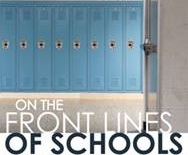Tonight, as I sifted through tweets checking for articles on the Chicago Teachers Union, I found a gem. In my opinion, the best Chicago Teachers Union Strike op-Ed by far. Posted in The New York Times, the author Alex Kotlowitz asked a serious question, “Are We Asking Too Much of Teachers?” This is a question I asked myself earlier this year as I made the difficult choice to leave the classroom.
Fueled by my passion to create better schools for all public school students, I started teaching giving it 100%, even when that meant putting my life on hold as I struggled to manage the individual life circumstances of each of my students. You see, I never intended to be a career teacher. Being a teacher was just my first step in a lifelong journey to help bring innovative solutions to the most ailing problems facing our nation’s most poverty-stricken communities. I hope to one day be at the table where major decisions are made to benefit our
students. I believe that teacher voice is critical at that table.
Moreover, as my teaching days went on and years passed, writing objective-driven lesson plans aligned to standards every day wasn’t all that would deem me effective under DC Public School’s IMPACT evaluation system. I had to create Girls and Boys Day to introduce my scholars to positive mentors that look like them and had gone to college. I did home visits to build relationships with parents. I brought volunteers into the school to help get it ready for the first day of school. I wrote Donors Choose grants to get more resources into my classroom. I did everything in my human power to try to circumvent poverty’s impact on my classroom.
Nevertheless, late nights and early mornings entering student data in a computer taught me (the hard way) what I knew all along from growing up in an poverty-stricken city in southern NJ–just being an effective teacher alone cannot solve poverty, and I could not stress myself out about it. Because stressing myself out about my some of my students living in homeless shelters, not having food on the table or proper clothes to wear will break a person down–especially a teacher who comes to school every day garnering all hope possible to challenge this reality head on.
Now do not get me wrong. I agree that teachers must teach the best they can while knowing that we’re working against negative neighborhood environments that can suck our children into a tornado of negative choices that limit their life’s positive outcomes. I know that great teachers in every classroom will ensure that a student can be strong enough to believe in their future more than the dark reality that they live. I know that great teachers make a difference, but what Mr. Kotlowitz sheds light on is that teachers alone cannot rid our country of poverty. Putting so much pressure on schools does not serve our children or communities. Schools must also be supported by economic policies at the local, state and federal levels that create more sustainable and socioeconomically diverse neighborhoods that produce more equitable schools.
While so many people have the luxury of never stepping foot in an impoverished community, teachers in our most troubled schools don’t. It’s easy to be on Capital Hill and never come to Southeast DC, but make sweeping generalizations about all the teachers who work in the “failing” schools. It’s easy to work in Chicago Public Schools’ Central Office and never fully empathize with a student who asks you every day to see his incarcerated father, but you have to tell him it’s okay and help him stay focused on the lesson. When we dare teachers to be on the frontlines, having the audacity to fight poverty in they see and feel, we better have their backs every step along the way.
More than likely, Chicago won’t be the answer to Mr. Kotlowitz’s question–just like schools alone cannot heal our nation from wound of poverty. However, when we bring thoughtful dialogue and perspective in the conversation, we allow a better product to be produced. Here’s to a quick end to the strike, but to continued conversation. Thank you for Chicago for sparking the dialogue. We can either use this as a time to point fingers or to really begin to ask the tough questions that help us create systemic solutions.
Mr. Kotlowitz, I applaud you for bringing depth to the conversation. To read his piece that inspired my post click here
